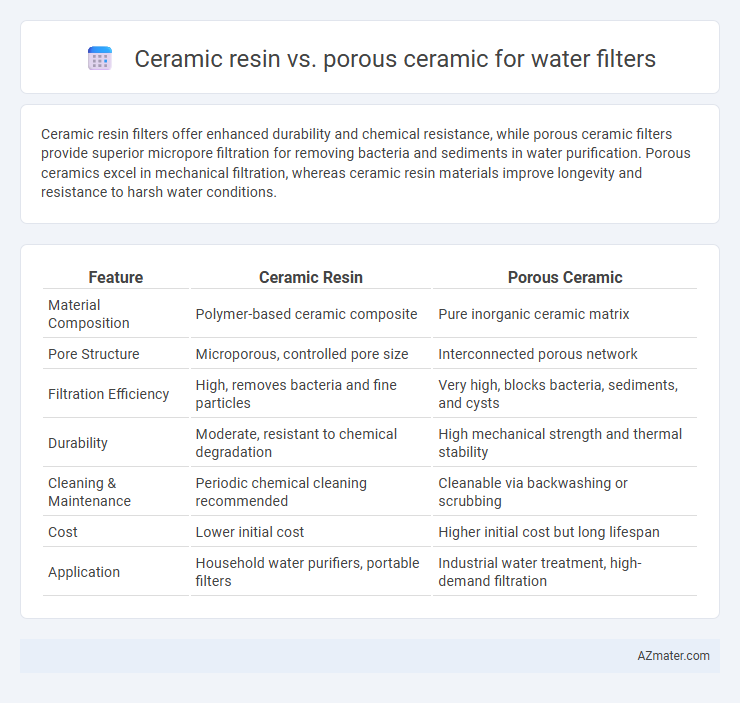Ceramic resin filters offer enhanced durability and chemical resistance, while porous ceramic filters provide superior micropore filtration for removing bacteria and sediments in water purification. Porous ceramics excel in mechanical filtration, whereas ceramic resin materials improve longevity and resistance to harsh water conditions.
Table of Comparison
| Feature | Ceramic Resin | Porous Ceramic |
|---|---|---|
| Material Composition | Polymer-based ceramic composite | Pure inorganic ceramic matrix |
| Pore Structure | Microporous, controlled pore size | Interconnected porous network |
| Filtration Efficiency | High, removes bacteria and fine particles | Very high, blocks bacteria, sediments, and cysts |
| Durability | Moderate, resistant to chemical degradation | High mechanical strength and thermal stability |
| Cleaning & Maintenance | Periodic chemical cleaning recommended | Cleanable via backwashing or scrubbing |
| Cost | Lower initial cost | Higher initial cost but long lifespan |
| Application | Household water purifiers, portable filters | Industrial water treatment, high-demand filtration |
Introduction to Water Filtration Technologies
Ceramic resin and porous ceramic represent two key materials in water filtration technologies, each offering distinct advantages in contaminant removal. Ceramic resin filters combine the mechanical strength of ceramics with ion-exchange resins, enhancing purification by targeting heavy metals and organic compounds, while porous ceramic filters rely on their fine microporous structure to physically trap bacteria and sediment. Advances in material science improve filtration efficiency and lifespan, making these technologies essential in providing clean drinking water in various settings.
What is Ceramic Resin?
Ceramic resin is a composite material combining ceramic particles with polymer resin to enhance structural integrity and filtration efficiency in water filters. Unlike porous ceramic, which relies solely on microscopic pores for trapping contaminants, ceramic resin offers improved durability and resistance to cracking while maintaining effective filtration of bacteria and sediment. This hybrid composition optimizes water flow and purification, making ceramic resin filters a durable alternative for domestic and industrial water treatment applications.
What is Porous Ceramic?
Porous ceramic is a highly permeable material composed of fine ceramic particles bonded together, allowing water to pass through while trapping contaminants such as bacteria, sediments, and impurities. Unlike ceramic resin, which relies on resin beads for filtration through ion exchange processes, porous ceramic uses a physical barrier mechanism to ensure clean, purified water. This natural micro-porosity makes porous ceramic filters durable, reusable, and effective for removing microscopic particles without altering the water's chemical composition.
Filtration Mechanisms: How Do They Work?
Ceramic resin filters utilize a combination of ceramic material and resin to trap contaminants by adsorption and ion exchange, effectively removing heavy metals, bacteria, and organic compounds from water. Porous ceramic filters rely on their micro-porous structure to physically block particles, bacteria, and pathogens, with pore sizes typically ranging from 0.1 to 0.5 microns, ensuring mechanical filtration of impurities. Both filtration mechanisms offer high efficiency but differ in their approach, with ceramic resin filters adding chemical interaction for enhanced contaminant removal.
Contaminants Removed: Resin vs Porous Ceramic
Ceramic resin filters efficiently remove heavy metals such as lead, mercury, and arsenic by using ion exchange processes, making them highly effective against dissolved contaminants. Porous ceramic filters excel in removing bacteria, protozoa, and suspended solids through physical filtration, trapping pathogens and particulate matter within their microscopic pores. Combining both materials can enhance water purification by targeting a broader range of contaminants including microorganisms and dissolved toxins.
Flow Rate and Water Pressure Comparison
Ceramic resin filters generally offer higher flow rates due to their less dense structure, allowing water to pass through more quickly compared to porous ceramic filters, which have finer pores that increase filtration efficiency but reduce flow rate. Porous ceramic filters typically require higher water pressure to maintain effective flow, whereas ceramic resin filters can operate efficiently at lower pressures. The trade-off between flow rate and water pressure is a key consideration when choosing between ceramic resin and porous ceramic materials for water filtration.
Durability and Lifespan
Ceramic resin filters typically offer enhanced durability due to their composite structure, resisting cracks and breakage better than traditional porous ceramic filters. Porous ceramic filters excel in filtration performance but are more prone to chipping and wear over time, which can reduce their lifespan. Overall, ceramic resin filters generally provide a longer functional lifespan, lasting several years under regular use, whereas porous ceramic filters may need more frequent replacement depending on water quality and maintenance.
Maintenance and Cleaning Requirements
Ceramic resin water filters require less frequent cleaning due to their smooth, non-porous surface, which resists clogging and bacterial buildup, reducing maintenance time. Porous ceramic filters necessitate regular backwashing and scrubbing to remove trapped particles and biofilm, ensuring consistent filtration performance. Cleaning porous ceramic filters typically involves gentle abrasion without harsh chemicals to preserve pore integrity, while ceramic resin filters can often be cleaned with simple rinsing methods.
Cost-Effectiveness and Accessibility
Ceramic resin water filters generally offer greater cost-effectiveness due to lower manufacturing expenses and longer lifespan, making them accessible for a broad range of consumers. Porous ceramic filters, while highly efficient at removing contaminants, often come with higher upfront costs and maintenance requirements, limiting their accessibility in low-income or remote areas. Evaluating total ownership costs, including replacement and operational expenses, is essential to determine the best option for water filtration needs.
Which One is Better for Your Water Filter Needs?
Ceramic resin filters offer superior durability and chemical resistance, ideal for removing bacteria and sediment while maintaining long-lasting performance. Porous ceramic filters excel in high filtration precision and are highly effective at trapping fine particles, making them suitable for applications requiring ultra-pure water. Choosing between ceramic resin and porous ceramic depends on your specific water quality concerns and filtration goals, with ceramic resin favored for longevity and chemical stability, and porous ceramic preferred for fine particulate retention.

Infographic: Ceramic resin vs Porous ceramic for Water filter
 azmater.com
azmater.com